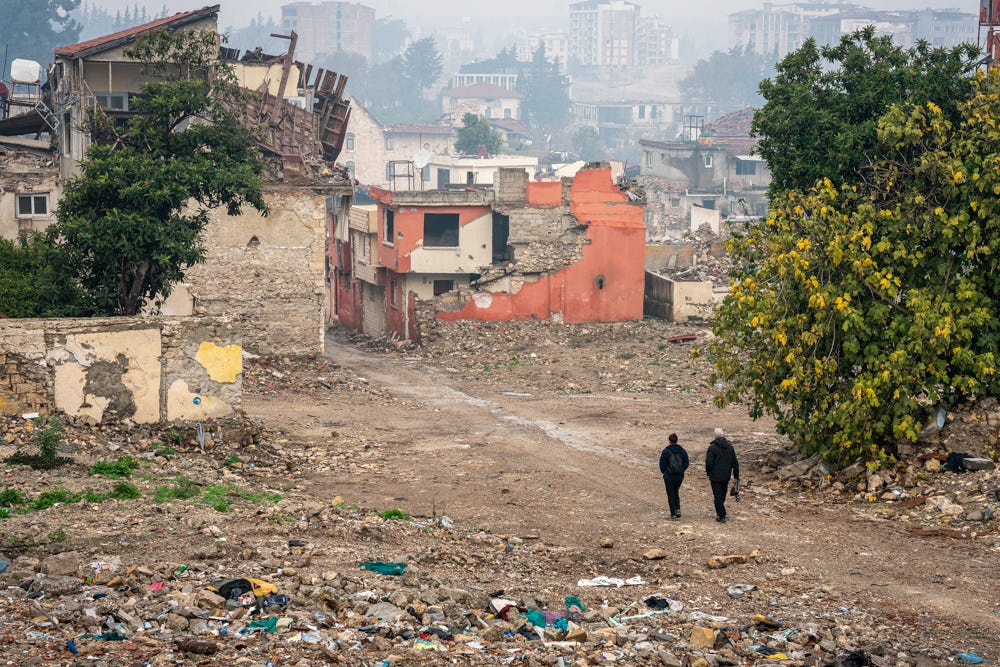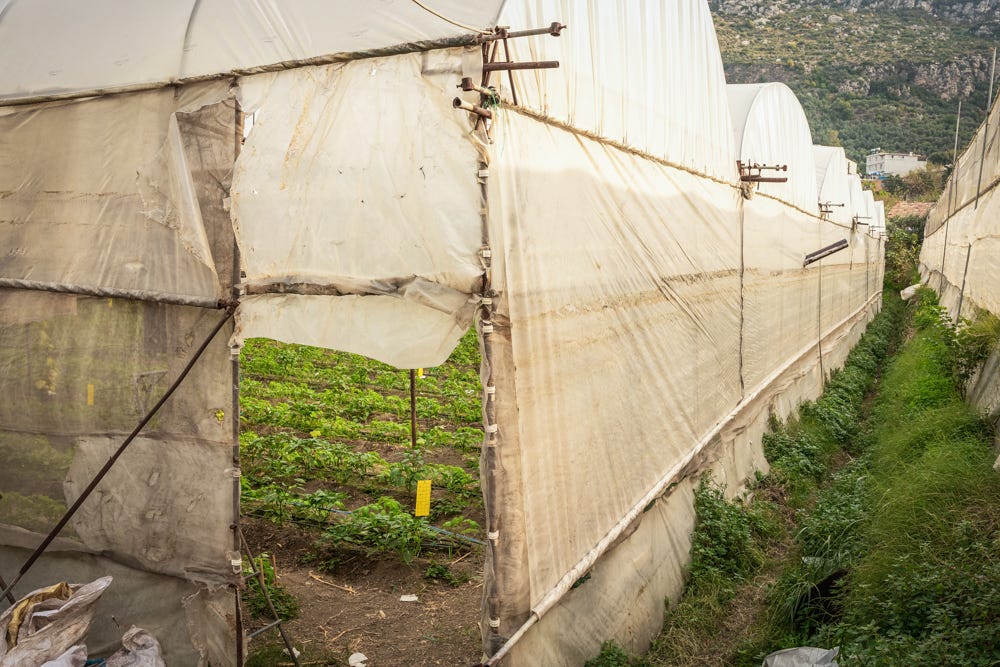Toxic dust and irregular harvests: Agriculture sector faces slow recovery in post-quake Hatay
HATAY – On an early morning in December, Neslihan Yıldırım washed fresh bunches of arugula, one after the other.
As a farmer, she followed the usual routine, rinsing her greens and sorting them into bags for sale at a nearby market. But after the Feb. 6 earthquake, she can no longer tell if her products are actually clean.
“This year, cress was not growing much in the areas where there was a lot of asbestos. It grew poorly,” said Yıldırım, who also grows peppers, herbs and other seasonal vegetables.
“Normally, this is a winter-loving plant,” she told Turkey recap, referring to cress. “The current weather is both cold and sunny, but the plant is constantly shrinking. After growing to a certain point, it starts to dissolve into the soil again. We couldn’t understand why this was happening.”
No research or tests have been conducted on her crops, so Yıldırım can only guess the cause of the odd growth cycle, though she thinks the nearby asbestos mound might be part of the reason.
About 100 meters from her field, rubble from collapsed buildings had been dumped for months. The mound remained an open dump site, often blowing dust onto Yıldırım’s lot, before it was recently covered with large sheets of fabric.
“We were exposed to a lot of dust. We were unable to clean [the crops], because as soon as we cleaned everything, it started to get dirty again,” Yıldırım said.
She started crying while talking about how hard it was to earn enough income and care for her two young children and elderly mother. All of them lived together in a container next to their damaged house.
Yıldırım’s daily struggles are just one example of the problems faced by farmers in post-quake Hatay. Uncertainty about the health and environmental risks caused by toxic dust and affected water supplies, coupled with lower quality harvests and reduced sales due to the mass population displacement affect many of the remaining farmers in the region.
The agriculture sector took a similar toll in nearby provinces as well, like Adıyaman, Kahramanmaraş and Malatya.
At the end of March 2023, the UN Food and Agriculture Organization (FAO) announced initial assessments indicated “significant impacts to agriculture,” estimating the Feb. 6 earthquake caused $1.3 billion in damage to physical infrastructure and agricultural possessions. The total loss of the sector, including economic impact, was estimated at $5.1 billion.
“More than one-third of the population in these hardest-hit provinces live in rural areas and rely on agriculture for their livelihood,” the FAO said in the statement.
Such hardships forced many to leave the region, but most farmers remain, saying they could not imagine living anywhere other than near their soil and their land.
Support programs for farmers
While many agriculture workers still struggle, the FAO and Turkish government published an earthquake recovery plan, which included an estimated budget of $112 million to support 700,000 people and over 850 companies.
Separately, the central government handed out cattle and beehives worth 909 million liras to cattle farmers in the earthquake zone. Private companies also provided support to farmers in Samandağ.
Ata Durgun, a farmer on the outskirts of Samandağ, said he did not receive any support from the government. Despite that, he never thought of leaving.
“We can't go anywhere else, this is our heritage,” he said, before enthusiastically recounting details about the farm he inherited with organically farmed Samandağ pepper, Samandağ tomatoes and dragonfruit.
The first weeks after the earthquake, his greenhouse turned into a shelter for about 100 people. He also faced problems selling his remaining crops in February and March.
With the help of solidarity organizations, he was able to sell what was left in his storage to the Kadıköy Municipality in İstanbul. Now he sells his vegetables to an intermediary who then distributes it to markets in the region.
But Durgun is also not sure about the effects of the earthquake on his crops. His Samandağ peppers didn’t grow. His beans were not doing well either.
“Something went wrong,” Durgun said. “But what went wrong? We have no knowledge of that.”
“Could it be an insect? Could it be the toxic dust winds that still come every couple weeks? Could it be the water?” he went on.
“Even 15 days ago, even 20 days ago, an extraordinary dust wave came. It was coming here with the wind,” Durgun said.
From demolition to construction
Eleven months after the Feb. 6 earthquake, dust remains a problem. At the time of reporting, in December 2023, it was raining, but during dry periods, dust from rubble collection areas spreads with heavy wind, with the risk of spreading asbestos as well.
Research by Deutsche Welle published in September, also found samples of fruit and plant leafs contained asbestos.
The demolition process is something that also concerns Sedat Duran, president of the Defne Agriculture Chamber and a farmer. The chamber has tried to prevent rubble from being dumped close to agricultural lands or waterways, but have not been successful in every case. Another issue is reconstruction.
“The central government and local administrators prioritize housing,” Duran said.
Container cities were built on agricultural land, and there are plans to build TOKİ buildings on olive groves, as well. The most well-known court case is underway in Dikmece in Antakya, where villagers protested against expropriation of their lands.
“They are ignoring agriculture right now,” Duran said, referring to the authorities and decision makers. “We see that as our real problem.”
In his own fields, Duran plants wheat, corn and cotton. His yields were also much lower than previous years, but he is not sure what that means for now. The coming season might reveal whether the irregular harvest is a one-time occurrence or a recurring problem, he said.
A few university officials came and took soil samples for analysis, but Duran did not hear anything about the results.
“It is impossible for us to see the [earthquake] effects on agriculture in one year,” Duran told Turkey recap. “If there are negative impacts in the longer term, we will see them much later. I hope that won’t be the case.”
Initial studies on asbestos and food
Food engineer Bülent Şık published a study in November, showing olive oil from three different olive groves close to rubble disposal areas in the Samandağ region contained no traces of asbestos.
“Asbestos is a toxic substance that becomes a health risk when airborne and inhaled,” Şık wrote on Bianet. “In academic literature, I have not come across a study showing that asbestos entering our bodies through food poses a health problem.”
After analyzing the olive oil samples, Şık concluded: “Concerns about finding asbestos in foods grown in the earthquake region and its potential to cause a health problem are unfounded or overly exaggerated.”
Nilgün Karasu, president of the Antakya Environmental Association voiced similar sentiments.
“Experts and scientists do not think that our groundwater is in great danger because asbestos is the biggest danger for us when it’s in the air,” she said.
“We were very worried about everything. We were very worried about the vegetables and fruits grown here. The experts reassured us on this matter,” she added, referring to Şık’s study.
But Karasu said she was worried regarding the environment more generally.
“The earthquake was ‘the disaster of the century’, but we also experienced the ecological destruction of the century,” Karasu told Turkey recap.
“Their main consideration is zoning. And right now, they are looking at Hatay as a development project,” she added, referring to the central government.
The term Karasu used for the demolition and reconstruction process was rant, a Turkish word that refers to a mentality that is profit-driven more than anything else.
“It is all about ‘What can I gain?’”, Karasu said, explaining the concept of rant and what she currently witnesses in Antakya, believing the first priority of the state is to make money or to make sure friendly companies or entities benefit from projects.
Deviating water supply
Despite some initial findings, farmer Ata Durgun was not completely reassured. He said the groundwater he uses from an artesian well has looked strange since Feb. 6.
“When we first opened the water tap, the water flowed like foam. For more than an hour, it looked like toothpaste,” he explained.
In July, Hatay’s water and sewage authority (HATSU) declared tap water to be drinkable, but additional research focusing on water quality by the Turkish Medical Association (TTB) in October advised people in Hatay against drinking water from the tap and added artesian and well water should be avoided.
Ali Kanatlı, from the TTB in Hatay, told Turkey recap this advice is still valid for drinking water, but there should be no problem for agricultural usage. Still, Durgun remains unconvinced. The combined effects of the post-quake damages remains unquantified.
“How much of an effect will it have on the vegetables?” Durgun asked, without expecting an answer.
Throughout, like the dust and chemicals in the environment, the psychological effects of the earthquake also linger on.
When lightning struck in the distance, Nurtan Ersa Durgun, Ata Durgun’s wife, froze for a second and asked if there was another earthquake? It was just thunder, but the fear was visible in her eyes.
Durgun then went into the greenhouse to have a look at his vegetables and petted his dog, because amid all the struggles, he saw no option other than to continue his work.
This newsletter is supported by readers via Substack and Patreon. Paid subscribers get full access to our recaps, reports, members-only Slack and more. We also have pun-tastic merch. All proceeds go towards sustaining our journalism.
Turkey recap is an independent news platform produced by the Kolektif Medya Derneği, an İstanbul-based non-profit association founded by our editorial team to support and elevate news media and journalists in Turkey.
Get in touch: send pitches, queries and feedback to info@turkeyrecap.com.
Diego Cupolo, Editor-in-chief @diegocupolo
Gonca Tokyol, Editor-at-large @goncatokyol
Ingrid Woudwijk, Managing editor @deingrid
Verda Uyar, Digital growth manager @verdauyar
Sema Beşevli, Editorial intern @ssemab_
Onur Hasip, Editorial intern @onurhasip
This article is part of a series of environmental reports produced with support from the Heinrich Böll Stiftung Turkey Office, and in no way can be interpreted to reflect the views of the Heinrich Böll Stiftung.










